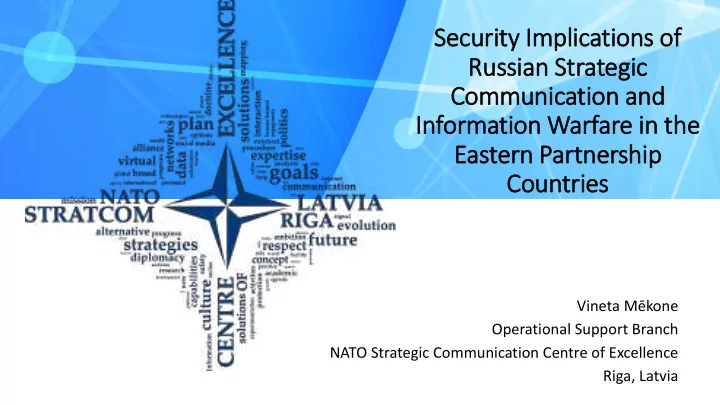

Security Im Implications of f Russian Str trategic Communication and In Information Warfare in in th the Eastern Partnership Countries Vineta Mēkone Operational Support Branch NATO Strategic Communication Centre of Excellence Riga, Latvia
NATO Stratcom COE “Aim is to provide a tangible contribution to the improvement of the NATO StratCom capabilities” Mission: • Assist in doctrine evolution through research, analysis and multi-disciplinary engagement • Improve interoperability and capabilities • Enhance education and training • Improve/validate concepts through testing • Support to operations 2
Milestones in the StatCom COE’s development: • 16 th January 2014 - Established as a Latvian national agency • 1 st July 2014 – DE, EE, IT, LT, LV, PL, UK signed MOU on establishment of the NATO StratCom COE as an international organisation. • 1 st September 2014 – NAC accredited the COE as a NATO Military Body 3
The main focuses of the Center so far • NATO Strategic Communications policy and doctrine • Hybrid warfare • Academic Magazine “ Defence Strategic Communications ” • Russia’s Information Campaign against Ukraine • ISAF Strategic Communications: best practices and lessons learned • Strategic Communications within Allied nations • DEASH information campaign • Online course “Strategic Communications for beginners” • NATO StratCom training and education • Weaponisation of Social media 4
Centre‘s reasearches and main findings on today‘s topic • Russia was prepared to conduct a new form of warfare in Ukraine and an information campaign played a central role • Russia‘s narrative is largely based on historical memory • The possible role of «compatriots» and their communities abroad should be considered carefully • There is „another side of the coin“ to Russia‘s information campaign • Deception is used by Russia as a tactic to distract and delay 5 • Disinformation campaigns erode over time
Centre‘s reasearches and main findings on today‘s topic 6
7
Russia’s ability to influence opinions through the manipulation Messages in Ukraine: Messages in Russia: • NATO is weak, • NATO is strong and pointless organization growing organization, membership – the main threat to harmful! Russia! • Ukrainians are fascists! • Ukrainians and Russians is the same nation, we had and will have a common history! 8
Case: Crucifixion of a Boy in Slovjansk • Report says that Ukraine army forced all local people to come to the center square and watch including boy’s mother • Babushkas living next to the central square of Slovjansk : “ never heard, unlikely such a thing ever happened, whole city would be talking about an event like that, and we live nearby – everyone would know” • And there is no Lenin square in Slovjansk, there in no square possible to accommodate thousands of people, there is no visual evidence in FB, Twitter, Instagram • Why it still matters – majority of people in Russia do not know babushkas’ part of the story 9
Implications of Russian information activities in auditory In targeted countries Russia is seeking: In Russia it is seeking: • Confusion, disinformation, • Ill – informed, misinformed society disappoinment and disorganization of society • To redefine democratic values • To erode public support for NATO, • To silence opposition EU, own government, military forces • To control the media by the government • To slow down reforms • To support to certain opposition, extreme movements • Ill – informed and/or slow decision making • To divide society and not only along nationality lines • National narratives to be lost 10
Russia’s strategic gains for weaponisation of information or information war • Redefining Euro-Atlantic values (democracy, media freedom, human rights, trust in international organizations, etc.) • To undermine current security order in the world and Europe in particular. In more recent words: Where is Russia’s part of Europe? – Within Russia’s borders • Prevent Ukraine, Moldova, Georgia from integration into Euro- Atlantic area, instead – establish their political, economic and military affiliation with Russia • Exploiting freedom of expression and ignoring professional journalistic standards distorted facts easily reaches audiences of democratic countries and raises audiences’ disbelief, questioning of any information available thus limiting ability 11 of a country to effectively communicate with its people
Redefining Euro-Atlantic values • Questioning credibility of those, who set international rules • Trust in other states’ governments should be questioned by everyone • The West is not following the international agreements • Ukraine violates international agreements, unlike Russia • Moral superiority of Russia • Europe is suffering from the actions of the U.S. • Lack of Western solidarity both - among themselves and with Russia • Western media sources are unprofessional, not credible, and influenced by politicians • Economic interests come first • Free market as a disadvantage and an illustration of the failure of the democratic system of governance 12 • Power of the Russian state is the central value for its citizens
Redefining Euro-Atlantic values 13
THANK YOU. 14
Recommend
More recommend